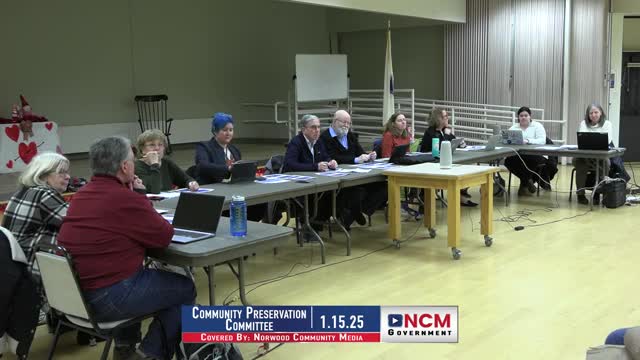Conservation Commission and Sportsmen Seek $200,000 Feasibility Study for Guile Pond
Get AI-powered insights, summaries, and transcripts
Subscribe
Summary
The Conservation Commission and the Norwood Sportsmen’s Association requested up to $200,000 for a feasibility study to assess repair, replacement or removal options for the Guile Pond dam and to evaluate dredging, habitat, recreation and public‑safety outcomes.
The Norwood Conservation Commission and the Norwood Sportsmen’s Association asked the Community Preservation Committee for up to $200,000 to fund a feasibility study for Guile Pond, a roughly 2.3‑acre town‑owned pond with a compromised earthen dam and spillway.
Carly Rutland, the Conservation Commission liaison, described the study as an effort to identify options — repair, replace or remove the dam/spillway — and to evaluate ecological, recreational and stormwater outcomes. The study would include concept drawings, public engagement, cost estimates and a recommended alternative to protect infrastructure, habitat and public safety.
Mike Reagan, treasurer of the Norwood Sportsmen’s Association and a long‑time volunteer at the pond, described the pond’s recreational history and the club’s annual children’s fishing derby. He said a makeshift spillway built about 25 years ago was damaged during heavy rains last winter; the club installed about 240 sandbags as a temporary measure. Reagan said a professional spillway and the option to dredge the pond would improve conditions for fishing and boating and could reduce vegetation such as lily pads that impede angling.
Presenters noted the pond is fed by upstream Willett Pond and drains toward Ellis Pond and that the site is surrounded by woods and homes. Rutland said possible outcomes of the feasibility effort include repaired or replaced spillway structures, managed aquatic vegetation, docks, improved walking paths and increased public outreach to raise awareness of public access at the sportsmen’s parking area off Nichols Street.
Committee members asked whether the proposal should frame the consultant scope as an evaluation of dam alternatives rather than as a “dam removal feasibility” to avoid implying a preselected outcome. The committee also suggested structuring the study’s options in three tiers (repair, replace, remove) with dredging and amenities as add‑on options so the town can see cost tradeoffs. Members flagged potential dependencies on downstream owners or state funding; presenters said Guile Pond had been classified in state materials as not presenting a high safety risk but that state participation in future work would depend on specific grant programs and standards.
No vote was taken at the hearing. Presenters said the feasibility study would inform future funding requests if the committee or Town Meeting elects to pursue design and construction work.
